|
|
|
Sort Order |
|
|
|
Items / Page
|
|
|
|
|
|
|
| Srl | Item |
| 1 |
ID:
189876
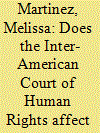

|
|
|
|
|
| Summary/Abstract |
Honduras, Guatemala and El Salvador have struggled to adopt measures of accountability and support for human rights norms since the end of the civil conflicts in the region. Many victims and activists have taken their cases to the Inter-American Court of Human Rights to gain reparations and accountability. How effective is the Inter-American Court of Human Rights at advancing human rights norms related to the cases it examines? I examine this question by developing the ‘domestic norm cycle’ theory, which extends Keck and Sikkink’s (1998) norm cycle theory. This theory captures how the ‘internalization’ of a norm takes place by examining political institutions. I argue that we can observe various stages of the ‘domestic norms cycle’ to examine how close or far the state is to fully adopting the norm. Although this article examines the levels of compliance with the Inter-American Court of Human Rights on El Salvador, Honduras and Guatemala, this theory can be applied to examine how external factors influence the development of human rights norms. This study has significant implications for how we observe support for human rights practices.
|
|
|
|
|
|
|
|
|
|
|
|
|
|
|
|
| 2 |
ID:
189874
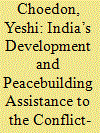

|
|
|
|
|
| Summary/Abstract |
The rationale for India’s development and peacebuilding assistance and the mechanisms employed have changed over the period. India’s assistance is starkly different from the way the developed countries do peacebuilding. This difference is due to India’s different historical experiences, socio-economic conditions and lived experience. The conflict-affected states have appreciated India’s assistance due to the suitability and appropriateness of technical assistance, training and educational programs to their socio-economic context. India’s ways of development and peacebuilding assistance have similarities with the 2016 UN concept of ‘sustaining peace’, which has been formulated to liberate peacebuilding from the strict limitation to post-conflict contexts. However, both the western and non-western donors have a certain reservation about ‘sustaining peace’ concept, for different reasons. The way forward to implement the UN ‘sustaining peace’ is to facilitate both the western and non-western donors to learn lessons from each other’s experiences and view their varied approaches as complementary rather than contradictory.
|
|
|
|
|
|
|
|
|
|
|
|
|
|
|
|
| 3 |
ID:
189875


|
|
|
|
|
| Summary/Abstract |
This article introduces the ‘deterrence failure’ concept and applies it to North Korea’s nuclear threat situation. For this purpose, it selects five factors, including retaliation posture; credibility of retaliation; probability of the challenger’s success; challenger’s irrational leader; and situational desperateness, to evaluate the US–South Korea nuclear deterrence posture against North Korea. Except for the retaliation posture, most factors are very concerning. Therefore, to strengthen their deterrence posture against North Korea, the United States and South Korea should take a few practical measures to ensure the implementation of the US extended deterrence, including the forward-deployment of more US retaliation assets around the Korean Peninsula.
|
|
|
|
|
|
|
|
|
|
|
|
|
|
|
|
| 4 |
ID:
189873
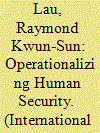

|
|
|
|
|
| Summary/Abstract |
The concept of human security, whose origin could be traced back to the 1994 Human Development Report published by the United Nations Development Programme (UNDP) represents an ambitious attempt to broaden the meaning of security and, perhaps most importantly, challenge the state-centric notion of national security. A resolution (A/RES/66/290) adopted by the United Nations (UN) General Assembly in September 2012 has, for the first time in UN history, formally recognized human security as an approach to ‘assist Member States in identifying and addressing widespread and cross-cutting challenges to the survival, livelihood and dignity of their people’. While the discussion of the human security concept continued within the UN, the advocacy of key UN member states for human security had been shifted to the Responsibility to Protect (R2P). Considering the fact that the potential role of the R2P to promote and operationalize human security has not been adequately explored, this article seeks to understand the positive potential role that R2P can play in operationalizing human security by exploring the relationship between the two. Acknowledging the efforts of Lloyd Axworthy, the former Canadian foreign minister, in situating ‘human security in the R2P era’, this article argues that R2P plays an important role in clarifying the scope and sharpening the focus of human security. This, therefore, can help strengthen the implementation of the human security concept.
|
|
|
|
|
|
|
|
|
|
|
|
|
|
|
|
| 5 |
ID:
189872
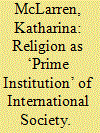

|
|
|
|
|
| Summary/Abstract |
Religion features in early English School work, disappears, and reappears in more recent literature. Arguably, it has not yet found a solid place in this theoretical framework, even though the English School is known to provide angles on the evolution of international society other approaches lack. Religion can unite and divide; leading to a strengthening or a weakening of identity and legitimacy. Faith endures and it can exist independently of states, it can constitute them and it can provide new forms of states and societies. Employing previous English School ideas from early and contemporary English School scholars as points of departure, religion is introduced as a ‘prime institution’. Based on the English School’s understanding of primary institutions constituting international society, this concept of a ‘prime institution’ provides an additional layer to international society. Such a prime institution helps grasp the multifacetedness of religion in the context of international society; identify patterns of religion’s (in-) significance for primary institutions; and examine the difference between religious and religion-averse states within the international society. This prime institution is illustrated with a so-called ‘quilt model’, which depicts the multiple layers of international society.
|
|
|
|
|
|
|
|
|
|
|
|
|
|
|
|
| 6 |
ID:
189877
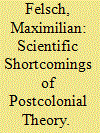

|
|
|
|
|
| Summary/Abstract |
In the social sciences, there is a trend towards normative, identity based and activist understanding of science. This trend is particularly evident in the rise of postcolonial theory. This paper critically engages with its impact in International Relations. Postcolonial theory aims to challenge established methodologies and arguments in all social science disciplines but shows little interest in rigorous research and the production of scientific knowledge. This paper highlights the most fundamental flaws of postcolonial theory, such as ideological bias, the application of blurred and one-sided concepts, the preference for anecdotal evidence over empirical evidence and ignorance of the major social and political trends of our time. Subsequently, it is argued that postcolonial theory contributes to a distorted perception of reality. Perhaps, this article can stimulate a debate about the function and scientific nature of social sciences at a time when feelings and emotions, not facts, increasingly dominate academia.
|
|
|
|
|
|
|
|
|
|
|
|
|
|
|
|
|
|
|
|
|